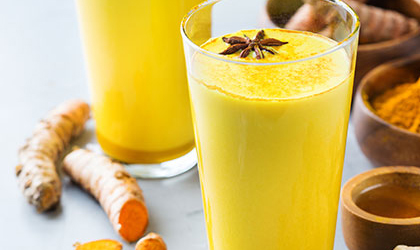
An age-old staple of Ayurveda medicine, turmeric has long been touted for its impressive health credentials. And in recent years, this golden herb has won especially wide acceptance by the wellness community. You’ve likely heard rumours or read articles about this proclaimed superfood. It’s the active ingredient in turmeric, curcumin, that’s deserving of all the praise. Thanks to its antioxidant properties, this powerhouse has shown immense promise in supporting countless areas of wellbeing. Here’s why you should be adding turmeric to more than just curries.
Drink it: iced golden milk
Golden milk is all the rage right now, exploding as the darling drink of the world. But who says it has to be enjoyed hot? Quench your thirst with this golden milk over ice. Blend 700ml of unsweetened almond milk, 3 tbsp. maple syrup, 1 ½ tsp. ground turmeric, ½ tsp. ground cinnamon, 1/4 tsp. ground ginger, and ¼ tsp. vanilla extract. Watch if that doesn’t jumpstart your taste buds!
To keep your grey matter healthy
Alongside quality sleep, exercise, eating your 5-a-day, and even the odd Sudoku puzzle, you can now add turmeric to your brain health arsenal. A raft of scientific research proposes curcumin may keep your grey matter happy by supporting healthy levels of the hormone, brain-derived neurotropic factor (BDNF), which plays a central role in long-term cognitive functioni.
Eat it: tangy turmeric dressing
Why not pimp up your dressing by adding turmeric to the mix? Combine 3 tbsp. extra virgin olive oil (another nourishing nutrient for your noggin), 2 tbsp. maple syrup, 1 tbsp. apple cider vinegar, 2 tsp. ground turmeric, and ½ tsp. ground ginger. The bright yellow and bold flavour is the perfect addition to roasted veggies, quinoa bowls, green leaves, and of course, your brain-bolstering arsenal.
Drink it: turmeric tonic
For head-to-toe TLC, fix yourself a taste bud-tantalizing turmeric tonic. Blend 2 cups of coconut water, 2 tbsp. fresh turmeric, 1 tbsp. fresh ginger, juice from one orange, 1 carrot, and 1 tbsp. honey. Et voila! A nourishing tonic to revitalise your body and mind at any time of the day.
To nourish your emotional wellbeing
Beyond supporting cognitive function, turmeric is thought to work wonders for your mood, too. Thanks to curcumin’s influence on the hormone, BDNF, experts believe turmeric may play a useful role in supporting overall emotional healthii. There’s even some data to suggest curcumin supports the ‘feel-good’ mood-regulating neurotransmitters, dopamine and serotoniniii. Here’s some tasty food for thought: in one study, scientists deemed turmeric helpful in the treatment of low moodiv. Impressive, or what?
Drink it: turmeric tea
Everyone knows a ‘nice cuppa tea’ is the antidote to emotional blips and ‘woe-is-me’ moments. But instead of your traditional milky brew, go for a mug of turmeric tea, which promises to tantalize your taste buds and lift your spirits. Simmer 1 tsp. cinnamon, a pinch of clove, 1 tsp. fresh ginger, 1 tsp. fresh turmeric, and 1-2 cups of water for 10 minutes. Strain, add honey to taste, and serve with your milk of choice (almond and hemp work a treat).
To support your gut
Listen up: turmeric may also keep your gut smiling. Though turmeric is technically a spice – and spices have a pretty poor reputation for aggravating digestive issues – research suggests this golden wonder can actually provide support for digestive healthv.
Eat it: gut-friendly ginger, turmeric, and carrot soup
Many would argue that soups are the ultimate healing food – cosy, comforting, and easy on the body. When an upset tummy strikes, this ginger (side note: ginger has been used for centuries to calm digestive issues), turmeric, and carrot soup will catch you. Added bonus: it’s mouth-wateringly good, too. Sauté 1 cup of chopped fennel, 1 leek, 1 cup of chopped squash, and 3 cups of chopped carrots in a large pan for 3-5 minutes. Then add 2 cloves minced garlic, 1 tbsp. grated ginger, 1 tbsp. turmeric, salt, pepper, and sauté for a few more minutes. Add 3 cups of vegetable broth and 1 can coconut milk, bring to the boil, and then simmer for 20 minutes. Finally, blend until creamy and serve with plenty of coriander. Then listen to your body mutter ‘thank you’.
To support your immune system
Time to add turmeric to your list of sickness-fighting tools. Because – and we’ll let you into a secret – it doesn’t get much better than this superfood spice for immunityvi.
Drink it: turmeric green smoothie
‘Eat your greens’ is advice we hear time and again, especially when we’re under the weather. To pump up the nutritional value of your veggies, add a teaspoon of turmeric to your favourite green smoothie. Blend 2 cups fresh kale with 2 cups of unsweetened coconut milk. Then add 2 cups of pineapple, 1 cup mango, juice of ½ lemon, 1 tbsp. grated ginger, ½ tsp. ground turmeric, and blend until smooth. Take that infection.
The golden rule (yes, pun intended)…
Besides cramming more turmeric into your diet, it’s equally important to be mindful of what you’re partnering it with. Chowing down on neat turmeric isn’t enough to unlock its magic (and it will probably taste foul, too – don’t try this at home, folks!). In order to reap the full benefits of this awesome herb, you need to consume it with fat-containing foods, like dairy, oily fish, avocados, and nuts. But this should be pretty easy if you use it during meal times. Time to stock up on this all-dancing, all-singing, all-nourishing spice, don’t you think?
References:
-
Dong. S., Zeng. Q., Mitchell. E.S., Xiu. J., Duan. Y., Li. C., Tiwari. J.K., Hu. Y. , Cao. X. & Zhao. Z. (2012). Curcumin enhances neurogenesis and cognition in aged rats: implications for transcriptional interactions related to growth and synaptic plasticity. PloS one, 7(2), e31211.
-
Kulkarni. S., Dhir. A. & Akula. K. (2009). Potentials of Curcumin as an Antidepressant. The Scientific World Journal. 9, 1233-1241.
-
Kulkarni. S., Bhutani. M. & Bishnoi. M. (2008). Antidepressant activity of curcumin: involvement of serotonin and dopamine system. NPsychopharmacology. 201(3), 435-442.
-
Sanmukhani. J., Satodia. V., Trivedi. J., Patel. T., Tiwari. D., Panchal. B., Goel. A. & Tripathi. C. (2013). Efficacy and Safety of Curcumin in Major Depressive Disorder: A Randomized Controlled Trial. Phytotherapy Research. 28(4), 579-585.
-
Dulbecco. P. (2013). Therapeutic potential of curcumin in digestive diseases. World Journal of Gastroenterology. 19(48), 9256.
-
Jurenka. J.S. (2009). Anti-inflammatory properties of curcumin, a major constituent of Curcuma longa: a review of preclinical and clinical research. Altern Med Rev. 314 (2): 141-153
You Might Also Like

Olivia
Olivia Salter has always been an avid health nut. After graduating from the University of Bristol, she began working for a nutritional consultancy where she discovered her passion for all things wellness-related. There, she executed much of the company’s content marketing strategy and found her niche in health writing, publishing articles in Women’s Health, Mind Body Green, Thrive and Psychologies.
View More



